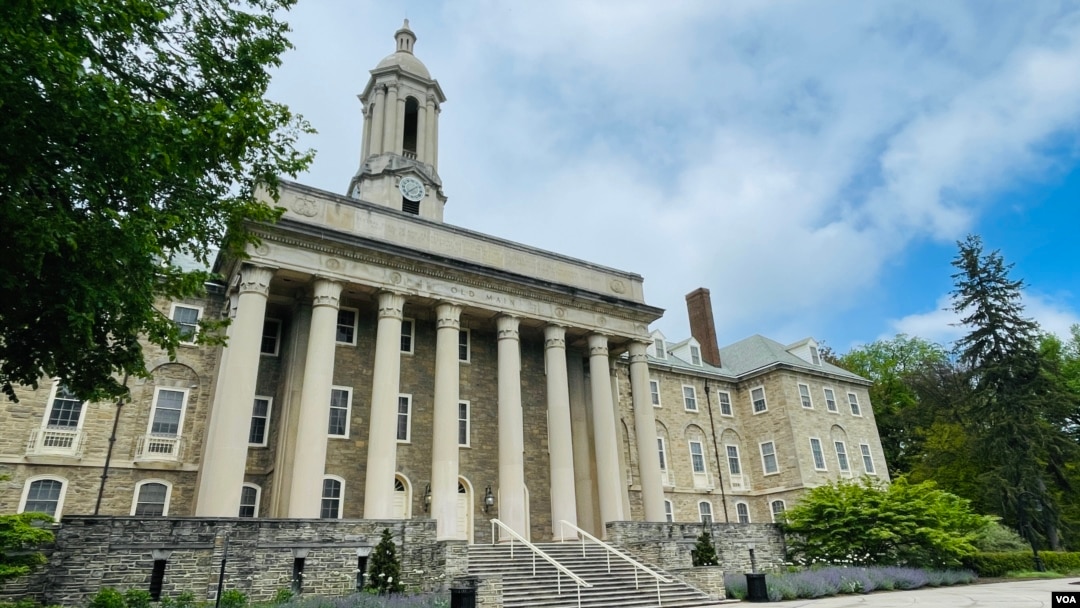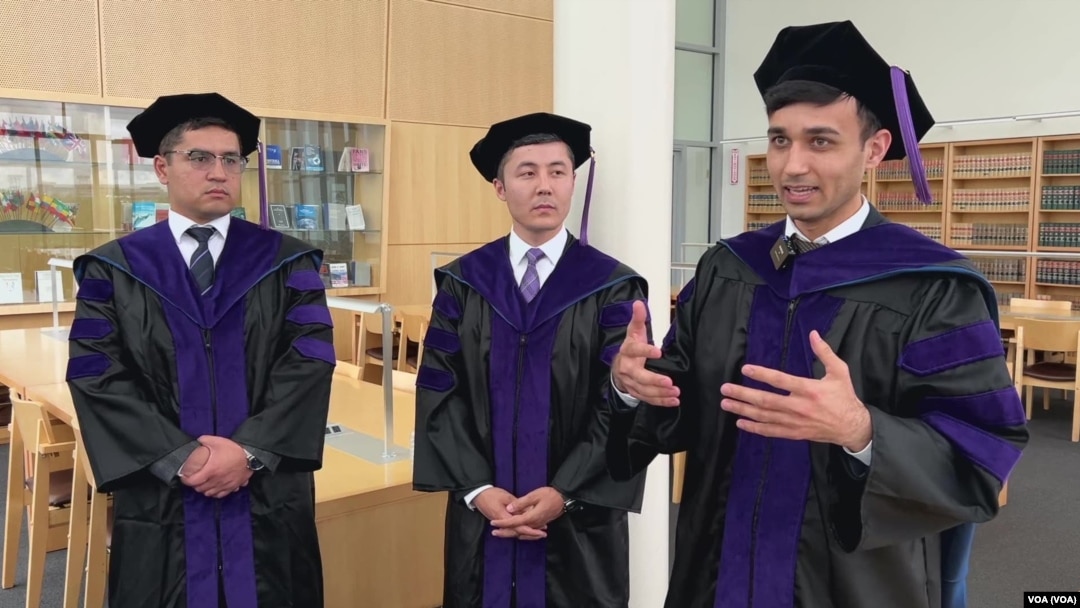Looking out over a sea of graduates at Penn State Law school's recent commencement, one could be forgiven for thinking it was in Central Asia.
One after another, 47 Uzbek men and women were called up on stage to be conferred an LLM (Master of Laws) degree by this American institution founded some 200 years ago. Nearly a third of the Class of 2024 hails from Uzbekistan, a country of 37 million people that has sent scores of students to this university in recent years.
But this year's size is unprecedented: No American university has ever admitted and bestowed this many degrees to Uzbeks at the same time.
"They are the true ambassadors of their country," Associate Dean Stephen Barnes told VOA. "We are a better community, better university, and a better country because of their contributions."
Barnes sees in these Uzbeks an "insatiable desire" to engage with the wider world.
As he explains, since 2021, Penn State has been forging ties with Tashkent State University of Law, Uzbekistan's premier legal education provider, and the University of World Economy and Diplomacy based in Tashkent, which has an international law program. An undergraduate diploma from these schools qualifies one for an LLM, bypassing the JD (Juris Doctor), America's most common initial law degree.

Built in 1867, Old Main is the administrative center of Pennsylvania State University in Pennsylvania, May 11, 2024.
Temurbek Polatov, 23, who spoke at the commencement, believes his cohort carries a unique responsibility to serve their homeland. He and others aspire to shape U.S.-type law firms and an independent bar association in Uzbekistan, which still largely retains a Soviet-style legal profession and judiciary.
Experts often mention corrupt courts and the lack of the rule of law as systemic problems hindering investment.
Most Uzbeks studying at Penn State were awarded grants, while three received full scholarships from their government.
Law grad priorities
Doniyorbek Davronov, 26, who served in two ministries before coming to the United States, wants to launch a legal clinic assisting Uzbek migrants worldwide.
"With millions working abroad," Davronov said, "the state and civil society must work together to defend their interests."
He observed the U.S. immigration system up close while doing clinical training, attending court hearings and visiting detention centers.
Davronov said thousands of Uzbeks are constantly stranded on the U.S.-Mexico border, and many are behind bars. "We can help them from Uzbekistan, collaborating with our American colleagues, providing necessary facts."
Classmate Shahboz Murodullayev, 23, shares his passion, proposing to create a network of services for migrants.
Jamshidbek Ibrohimov, 27, who earned an LLM from Penn State last year, is now working at Rogers & Rogers, a Pittsburgh-based immigration law firm that often represents Central Asians.
FILE - Shakhrizoda Mamasolieva is among this year's 47 Uzbek LLM graduates at Penn State Law, State College, Pennsylvania, May 10, 2024.
"We should never underestimate the role of community organizations, which are crucial in fighting for the interests of their own people. They can provide the first line of assistance to migrants," he said.
Ibrohimov sees value in gaining practical experience in the U.S. before returning to Uzbekistan, where he worked at the Justice Ministry.
"I want to be part of positive change, something I already feel I'm doing from here," Ibrohimov told VOA.
Shakhrizoda Mamasolieva, 23, plans to train at U.S. firms while translating legal literature into Uzbek and helping youth get into American schools.
"We are supporting Uzbekistan's development. I'm more capable of contributing from here because of my network and opportunities available," she says.
She, too, received a scholarship from the university and worked on campus to earn extra money.
Farzin Vahidov, 25, from the Class of 2023, is Penn State Law's student adviser, connecting it with Central Asia.
"We have the most open-minded and enthusiastic youth coming here. This is why Penn State accepts them and cherishes their presence on campus," Vahidov said. "As for the alumni, some already work in high levels back at home, but I think the greatest achievements are yet to come."
Uzbek graduates at Penn State Law, State College, Pennsylvania, talked with VOA, May 10, 2024.
Rejoining legal community at home
Azizjon Jamolov, 32, will return to a new job in Uzbekistan's Supreme Court. He will head the human resources department and hopes to introduce new ethics norms and best practices.
"I'm inspired by what I learned here, especially the way the judiciary functions and the level of professional integrity," Jamolov said.
He acknowledges that it will be extremely difficult to change people's mentality, especially in the fight against corruption, but he is optimistic that the administration will back his initiatives.
Jamolov studied through the El-Yurt Umidi Foundation, a state program aiming to curb Uzbekistan's "brain drain" and create a cadre for the government and other sectors.
Since 2018, the foundation has sponsored roughly 2,000 degrees and trainings abroad, with some 550 currently underwritten. Applicants must be admitted to one of the top 300 schools in the world and convince authorities that they will come back to Uzbekistan to lead in their field.
This is quite a small contingent among the over 110,000 Uzbeks studying internationally, according to UNESCO, mostly in neighboring countries and Russia, and only about 1,500 in America.
Uzbekistan is one of the top five countries with students abroad, along with China, India, Vietnam and Germany.
But El-Yurt Umidi and state educators urge quality over quantity. Penn State graduates agree and point to individual freedom and ambition as driving factors.
Along with Davronov and Jamolov, Behruz Shamsuddinov, 28, is an El-Yurt Umidi fellow, ready for any position the government has in store for him "as long as there is enough space to push for the rule of law." Shamsuddinov has a background in criminal justice and wants to see the system reform.
Professor Stephen Ross, whose contract law classes many Uzbeks have taken at Penn State, believes his students have gained vast comparative knowledge. "I would hope that the president and the ministers would have the confidence to know that they are trying to shape Uzbekistan in the best way for Uzbeks, and they can borrow the things that work from the U.S. for Uzbekistan," Ross told VOA.
Professor Lara Fowler, who teaches environmental, energy and natural resources law, says these graduates have a better understanding of issues because of deep exchanges with classmates from around the globe.
Associate Dean Barnes and the faculty argue that legal skills, critical thinking and mastering professional English, in particular, are universally applicable.
Penn State Law is expecting another batch of some 50 students from Uzbekistan this year.


